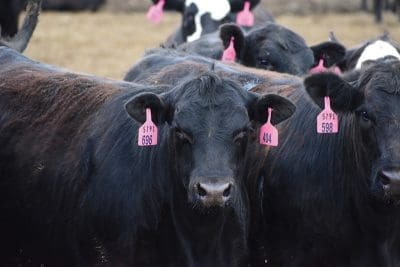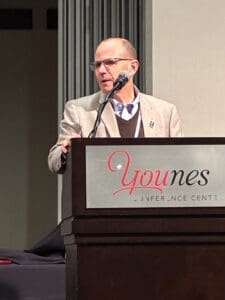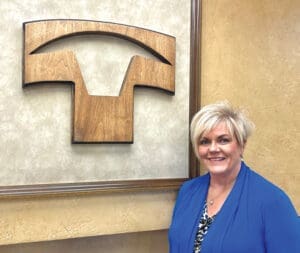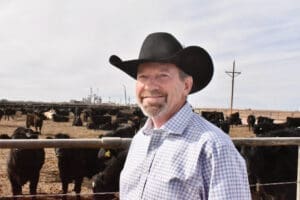Larry Stalcup, Contributing Editor
The practice of one beef industry segment trying to get the best of another has never been healthy. Everyone wants a profit, but taking advantage of another person’s pitfalls usually fabricates into someone getting the toughest cut of the carcass. Beef Marketing Group (BMG) operates from a blueprint that is geared to reward value creation.
BMG is a producer cooperative that has profit in mind. It relies on producing and feeding cattle that ultimately meet consumers’ demand for quality beef. BMG serves as the “hub of a wheel, while the spokes are ranchers, feedyards, packers, retailers and consumers,” says John Butler, CEO of BMG, headquartered in Manhattan, Kan. “It’s our form of virtual integration in the beef industry.”
In the BMG system, cattle are fed in 16 feedyards, with 12 in Kansas and four in Nebraska. Together they have a 320,000-head one-time feeding capacity. Finished cattle are processed through one packer, Tyson Fresh Meats at processing facilities in Holcomb, Kan., and Lexington and Dakota City, Neb.
All of the BMG yards are Progressive Beef™ certified. Progressive Beef is a quality management system focused on best management practices at the feedyard level. Beef Quality Assurance (BQA) was a foundation for starting Progressive Beef, but today the system goes beyond the scope of BQA standards. Butler says Progressive Beef has more than 40 standard operating procedures, with requirements related to antibiotic-use reporting, compliance to environmental regulations, sustainability and more. There is also priority put on internal audit support and annual training.
The Progressive Beef commitment is significant. BMG member feedyards are audited twice annually. One is an internal audit conducted in cooperation with a member of the Progressive Beef team. A third-party U.S. Department of Agriculture-approved auditor conducts the second audit to verify compliance to ensure that animals receive the high-quality care that produces safe and healthy beef. Yards receive an audit score with metrics to help manage their customized, continuous improvement plan.
To add credibility, Progressive Beef has developed an independent advisory board responsible for the standard. Temple Grandin, Ph.D., of Colorado State University, whose cattle-handling methods revolutionized the industry, was one of the original members of the board. Frank Mitloehner, Ph.D., University of California-Davis sustainable livestock specialist, is on the advisory board also. Other board members include veterinarians, cattle nutritionists, and animal welfare and sustainable livestock experts who help set the standards to maintain a high level of animal care.
Aligned Partnerships
A partnership with Performance Food Group (PFG) has created additional value for BMG. BMG has specifically aligned with PFG on the Braveheart Black Angus Beef brand – a branded beef program that ultimately provides high-quality cattle with a verified story addressing the needs of the Braveheart customer. About 2,000 cattle are harvested for the Braveheart program each week.
“Our overall focus in this aligned partnership is on producing a consistent supply of cattle and a product that consumers will demand,” Butler says. “Growing demand is not a challenge that should be taken lightly. We’re continuously trying to better understand the consumer, to know what they’re looking for.”
PFG researched what its customers and consumers wanted. They found humane care and handling of the animals was near the top of the list. Healthy husbandry is a no-brainer for producers, but consumers want assurance. Butler says BMG must stand behind the product they are producing and that the cooperative must continuously work to gain consumer trust. This requires a commitment to transparency and a willingness to answer questions about the care and handling of the animals as well as the origin of beef they purchase. He says the Progressive Beef certification is critical in this effort.
“PFG was looking for a partner that could supply a consistent source of cattle to meet the growing demands of the Braveheart brand,” he says. “BMG’s commitment to Progressive Beef allows for a shared vision that creates transparency for our customers. There are annual, third-party Progressive Beef audits to verify we’re doing what we say we’re doing when it comes to caring for cattle.”
One specific demand from PFG was a smaller muscle to meet customer demand, particularly food service, for a smaller ribeye. “We needed to feed more heifers,” Butler says. “We asked Tyson to disassemble and fabricate the Braveheart-selected carcasses. That works for them because we are creating value, and PFG paid for the cost of the extra work. BMG’s role is to consistently supply the cattle.”
Cattle Management
BMG relies on multiple sources of feeder cattle to be able to provide the consistent supply of harvest-ready cattle for the Braveheart program. Sources include ranchers, stockers and cattle available thru sale barns and video auctions.
“We need a variety of options to help us maintain a consistent supply of cattle for our feedyards,” Butler says. “In some cases, we will grow cattle and stage them for feeding. The logistics required to supply cattle 52 weeks a year are significant. Not only do we need to be sensitive to markets, but we need to stage feeders into our yards by using grass, rye and wheat growing facilities, allowing for a more constant supply coming into the yards.”
Many BMG feedyards have access to farmland. They grow crops utilizing manure from pens, which reduces the need for commercial fertilizer and increases efficiency. “Also, we regularly feed distiller’s grains in our rations,” Butler points out. “To further improve efficiency, we developed a partnership with an ethanol plant. Its co-products go directly back to the feedyards.”
Electronic ear tags enable feedyards to tie information from the ranch to their record system. Yards can provide carcass data back to the ranch for any animal. BMG is also exploring new technologies, including blockchain, to determine if there is opportunity to seamlessly and confidentially transfer information that could be valuable to participants in the supply chain.
Industry Involvement
Butler says partnerships and involvement across the beef cattle industry have been important to the Beef Marketing Group. In addition to PFG, Wendy’s, Where Food Comes From, Tyson and the U.S. Roundtable for Sustainable Beef have been strong supporters of BMG and Progressive Beef.
In addressing industry issues, Butler points out the need to better accommodate smaller producers. “We still need to address the cow-calf operator. There are huge numbers of smaller producers,” he says. “Improved trust is also needed among ranchers, feedyards and packers.”
He believes BMG is on the right track in promoting and facilitating the pasture-to-plate philosophy. “Trying to connect a ranch in one part of country to the meat case in another can be difficult,” Butler says. “That’s why we try to look at the end before we start. We must know how we can impact that in a positive way.”
SIDEBAR:
Mid-Kansas Farmer-Feeder Likes Benefits from Beef Marketing Group
Zimm’s Feedlot in Sterling, Kan., has a 3,600-head feeding capacity. It may be small compared to larger commercial yards, but it enjoys advanced production and marketing systems as part of the Beef Marketing Group.
It is one of 16 Beef Marketing Group (BMG) member feedyards. Todd Zimmerman, head of the family-owned, central Kansas farmer-feeding operation, sees many of his finished cattle go to the Braveheart brand.
“Two days a week we typically send cattle to Tyson in Holcomb and the Braveheart program,” he says. We appreciate the value we receive by marketing our cattle with BMG.”
Zimmerman grew up on the 4,500-acre farm and cattle operation. He started helping his dad fulltime in 1985. “I did most of the farming and he ran the feedyard,” Zimmerman says. “When he died in 1998, I started handling both. About 85 percent of the cattle are custom fed, with many from ranches taking part in the BMG production program.”
The farm’s corn, soybean, wheat and rye grass service the feedyard. “We run a dry-roll feeding system,” Zimmerman says, adding that a neighboring ethanol plant provides distiller’s grains for part of the feeding rations.
“We’re able to place some calves go onto rye pasture before going on feed to balance the finishing process.”
John Butler, BMG’s CEO, says many ranchers across the Kansas/Nebraska BMG region retain ownership. “They see potential for a better premium in the end,” he says.
Butler doesn’t favor movements for government involved mandatory negotiated cash trade.
“One of our industry’s strengths is we’re based on free enterprise,” he says. “We’re focused on understanding the value of the carcass. We receive premiums for higher quality cattle, and get discounted for lower quality cattle.
“If we get into a government-controlled mandatory cash market, it could take away much of the progress we have made. It could change our overall behavior.”
Zimmerman agrees. “The BMG program makes me strive to do better to provide what the consumer wants,” he says. “Mandatory negotiated cash trade could hurt our pricing opportunities.”





